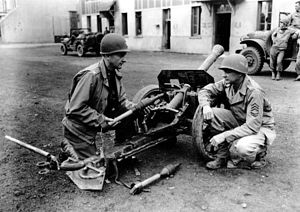8.8 cm Raketenwerfer 43
| 8.8 cm Raketenwerfer 43 | |
|---|---|
 The 8.8 cm Raketenwerfer 43 being inspected by Allied troops. Note the presence of the wrong ammunition [a] | |
| Type | Anti-tank rocket launcher |
| Place of origin | Nazi Germany |
| Service history | |
| In service | 1943–45 |
| Used by | Nazi Germany |
| Wars | World War II |
| Production history | |
| No. built | ~3000 [1] |
| Specifications | |
| Mass | 143 kg (315 lb) |
| Length | 2.9 m (9 ft 6 in) |
| Width | 1 m (3 ft 3 in) |
| Height | .89 m (2 ft 11 in) |
| Crew | 2 |
| Cartridge | RPzB. Gr. 4312[2] |
| Caliber | 88 mm (3.5 in) |
| Action | breech loaded, fired from closed breech[2] |
| Muzzle velocity | 140 m/s (460 ft/s) |
| Effective firing range | 230 m (750 ft) (moving target) 500 m (1,600 ft) (stationary target)[2] |
| Maximum firing range | 750 m (2,460 ft) |
The 8.8 cm Raketenwerfer 43 Puppchen[b][3] was an 88 mm calibre reusable anti-tank rocket launcher developed by Nazi Germany during World War II.
Raketenwerfer 43 was given to infantry to bolster their anti-tank capability. The weapon was fired from a small two-wheeled gun carriage which fired a percussion-primed, rocket-propelled, fin-stabilized grenade RPzB. Gr. 4312[2] with a shaped charge warhead. The grenade had a shorter tailboom of 490 mm (19 in) compared to the 650 mm (26 in) tailboom for the electrically-primed grenade RPzB. Gr. 4322 for the Panzerschreck.[2][4] Both grenades used identical warhead and fuzing.[2]

Approximately 3,000 units were completed from 1943 to 1945. It was made in much smaller numbers than either the Panzerschreck, which was based on the American bazooka rocket launcher, or the Panzerfaust, which was a disposable anti tank recoilless rifle. This is partly because it was realized that a simple hollow tube with an ignition device was all that was needed to launch the 88 mm rocket, rather than an elaborate miniature artillery piece with carriage and breech. Due to the carriage and better sights, the accuracy was better, and the range more than double that of the Panzerschreck. However, Raketenwerfer 43 was more expensive, heavier and had longer production time than Panzerschreck or Panzerfaust.[2]
See also
[edit]References
[edit]- ^ Panzerfaust and Panzerschreck by Rottman, Gordon L. Shumate, Johnny page 29.
- ^ a b c d e f g Gordon L Rottman; Johnny Shumate; Alan Gilliland (20 August 2014). Panzerfaust and Panzerschreck. Osprey Publishing. pp. 29–30. ISBN 978-1-78200-790-6. Retrieved 9 September 2015.
- ^ ""Puppchen" (auch "Püppchen" ? ) = 8,8cm Raketenwerfer 43, in Frankreich". Forum der Wehrmacht. 19 October 2013. Retrieved 19 April 2015.
- ^ "8.8 cm R. Pz. B. Gr. 4312: Antitank Rocket Grenade". Catalog of Enemy Ordnance. U.S. Office of Chief of Ordnance. 1945. Archived from the original on 4 March 2016. Retrieved 6 August 2015.
Notes
[edit]- ^ Projectile in the image held by officer is RPzB. Gr. 4322 electrically primed with long tailboom, meant for Panzerschreck. Raketenwerfer 43 projectile RPzB. Gr. 4312 is percussion primed and tailboom is shorter.
- ^ Many sources refer to this weapon as Püppchen, German for "little doll". The official name was Puppchen without the umlaut.
External links
[edit]
